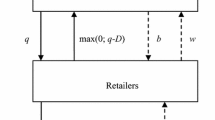Abstract
Cooperative coalitional games study the selection of chain partners, the formation of supply chains and outcome allocations. The chain value of a coalition depends on the outcome of inter-chain competition. Subsequently, chain partners may accept their payoffs or decide to defect to another coalition that has made a higher tender offer. The formation and defection continues until a stable Cournot-Nash equilibrium is reached. This is the state where no player may unilaterally defect to another coalition and earn a higher profit. We formulate the cooperative coalitional game as a variational inequality problem and propose an iterative diagonalization algorithm to determine the steady state for the game. The computational results illustrated that (1) supply-chain competition may not necessarily preserve the same level of social welfare; (2) internalization of resources and costs may distort the general competition economy; and (3) wielding the power in a supply chain does not necessarily translate into higher profits.


Similar content being viewed by others
References
Bernstein F, Federgruen A (2003) Pricing and replenishment strategies in a distribution system with competing retailers. Oper Res 51(3):409–426
Cachon GP, Lariviere MA (2005) Supply chain coordination with revenue-sharing contracts: strengths and limitations. Manage Sci 51(1):30–44
Cachon GP, Netessine S (2004) Game theory in supply chain analysis. In: Simchi-Levi D, Wu SD, Shen ZM (eds) Handbook of quantitative supply chain analysis: modeling in the e-business era. Springer Science, New York
Chauhan S, Proth JM (2005) Analysis of a supply chain partnership with revenue sharing. Int J Prod Econ 97(1):44–51
Christopher ML (1992) Logistics and supply chain management. Pitman Publishing, London
Dafermos S (1983) An iterative scheme for variational inequalities. Math Program 26:40–47
Gerchak Y, Gupta D (1991) On apportioning costs to customers in centralized continuous review inventory systems. J Oper Manage 10(4):546–551
Hartman BC, Dror M (1996) Cost allocation in continuous-review inventory models. Nav Res Logist 43(4):549–561
Kinderlehrer D, Stampacchia G (1980) An introduction to variational inequalities and their applications. Academic, New York
Konishi H, Ray D (2003) Coalition formation as a dynamic process. J Econ Theory 110(1):1–41
Lal R (1990) Improving channel coordination through franchising. Mark Sci 9(4):299–318
Leng M, Parlar M (2009) Allocation of cost savings in a three-level supply chain with demand information sharing: a cooperative-game approach. Oper Res 57(1):200–213
Meca A, Timmer J, Garcia-Jurado I, Borm PEM (2004) Inventory games. Eur J Oper Res 156(1):127–139
Murphy PR, Wood DF (2004) Contemporary logistics, 8th edn. Prentice Hall, Upper Saddle River
Nagarajan M, Sosic G (2008) Game-theoretic analysis of cooperation among supply chain agents: review and extensions. Eur J Oper Res 187(3):719–745
Pasternack B (1985) Optimal pricing and returns policies for perishable commodities. Mark Sci 4(2):166–176
Plambeck EL, Taylor TA (2004) Implications of breach remedy and renegotiation for design of supply contracts. Stanford GSB research paper 1888.
Richey RG, Tokman M, Skinner LR (2008) Exploring collaborative technology utilization in retailer-supplier performance. J Bus Res 61(8):842–849
Slikker M, van den Nouweland A (2001) Social and economic networks in cooperative game theory. Kluwer Academic Publishers, Boston
Taylor T (2002) Supply chain coordination under channel rebates with sales effort effects. Manage Sci 48(8):992–1007
Tsay A (1999) The quantity flexibility contract and supplier-customer incentives. Manage Sci 45(10):1339–1358
Xue L (1998) Coalitional stability under perfect foresight. Econ Theory 11(3):603–627
Acknowledgement
This research was partially supported by grants NSC98-2410-H-006-011-MY2 of the National Science Council, Taiwan.
Author information
Authors and Affiliations
Corresponding author
Rights and permissions
About this article
Cite this article
Lin, CC., Hsieh, CC. A Cooperative Coalitional Game in Duopolistic Supply-Chain Competition. Netw Spat Econ 12, 129–146 (2012). https://doi.org/10.1007/s11067-011-9154-y
Published:
Issue Date:
DOI: https://doi.org/10.1007/s11067-011-9154-y




